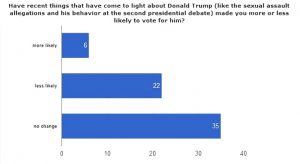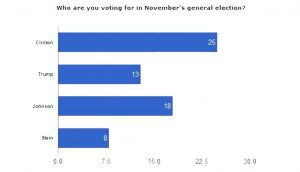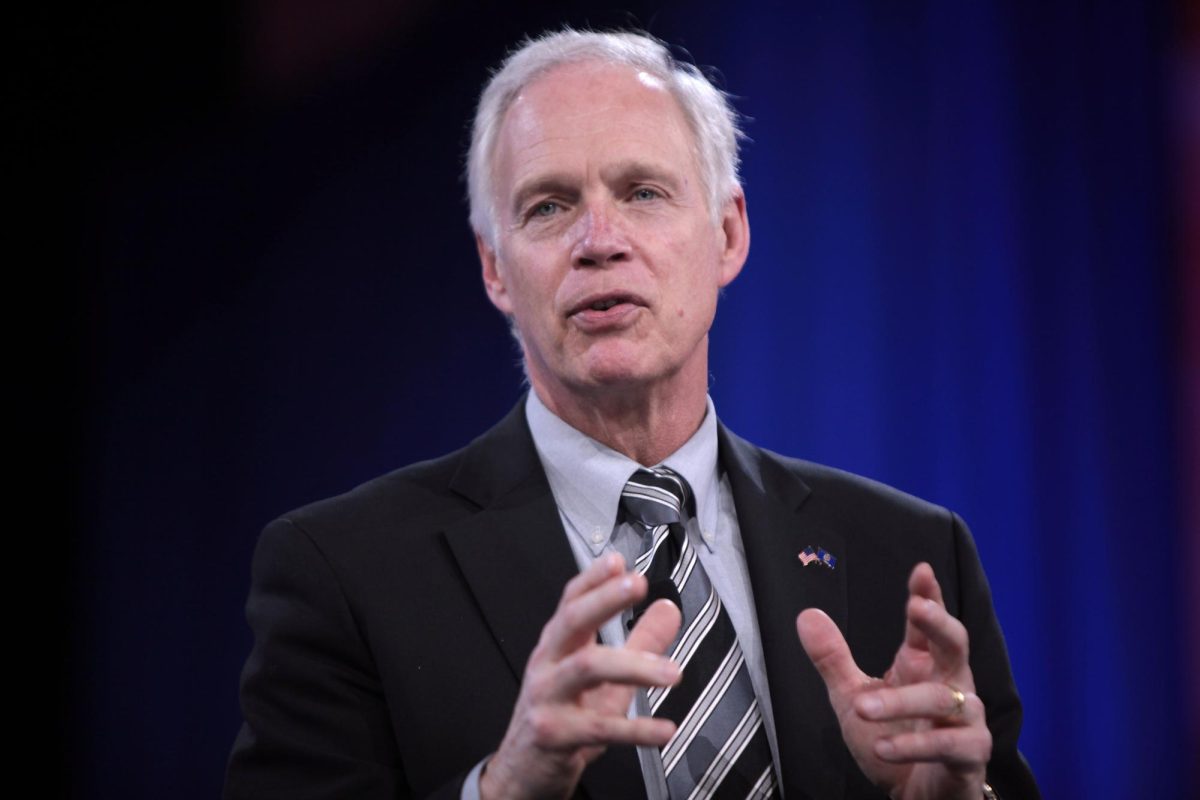[media-credit id=152 align=”alignleft” width=”300″] [/media-credit]
[/media-credit]
[media-credit id=152 align=”alignleft” width=”300″] [/media-credit]
[/media-credit]
After the second presidential debate and the leaked video of Donald Trump talking to Billy Bush, a poll conducted by the Advance-Titan shows UW Oshkosh students are less likely to vote for Trump.
Two polls were available on the MyUWO Portal. One asked students if they were more or less likely to vote for Trump based on recent events, and the other asked students which candidate they intended on voting for.
Hillary Clinton was the most popular candidate in the A-T candidate choice poll, receiving 25 of 64 votes. Gary Johnson finished with the second-most votes, gathering 18. Trump received 13 votes, and Jill Stein got eight.
In the other poll, 22 of 63 voters said they were now less likely to vote for Trump since the video leak, sexual assault allegations and debate performance. Six voters said they were now more likely to vote for him, and 35 responders said their likelihood to vote for Trump had not changed.
Political science professor James Krueger said the video of Trump talking to Bush caused an immediate reaction in the national polls the next weekend.
“Clinton’s numbers changed dramatically over the weekend in favor of her chance of winning, and we’ve seen that those numbers have remained solid,” Krueger said.
According to Krueger, Wisconsin voters also reacted strongly to the leaked video.
“Wisconsin voters, at least initially over the weekend … showed a huge reaction to a release of those tapes,” Krueger said. “You have to assume that everything we see subsequently reinforces that narrative, and it’s going to be very hard for Trump to compete as a result.”
President of UWO College Democrats Brandon Colligan said the video did not change his mind on Trump, it only reinforced what he already believed.
“The video didn’t change my mind about him because he had already established his extreme sexism, bigotry, xenophobia, etc,” Colligan said. “He had already made publicly sexist statements so the videos have only reaffirmed what we knew/saw.”
A representative from the UWO College Republicans and from the Young Americans for Liberty were not available to comment on the story.
UWO junior Markus Oechsner said the comments made by Trump in the video were outdated and only due to his celebrity status.
“If I recall correctly, it was 11 years ago these things came out,” Oechsner said. “He is a celebrity and a personality, we see that even now.”
Oechsner said Trump’s comments are not indicative of how his presidency will go.
“I think those comments were wrong, but they don’t reflect how women will be treated in his presidency,” Oechsner said.
Colligan said the chances of Trump winning at this point are “historically slim.”
“Some major political event, scandal or a tragic event [would have to] happen to Clinton for [Trump to win],” Colligan said. “But chances of anything [happening] to create a dramatic shift in persuadable voters is razor thin at this point.”
Oechsner said he intends on voting regardless of the lead Clinton has at the moment in many polls, although he has concerns about the Electoral College voting system.
“It’s important to have an opinion and if you believe in it you should vote,” Oechsner said. “But there are so many uneducated people that the people who have an educated vote get overshadowed.”
According to Oechsner, he will be voting for Trump, but he does not believe there is such a thing as a correct way to vote.
“I don’t want to say I know which way is the best to vote,” Oechsner said. “That would be ignorant.”
Colligan said voting is extremely important, despite which way students are leaning in the election.
“When you vote, you not only voice your support of one candidate, but also reaffirm your place in the democratic process,” Colligan said. “When you place your ballot as a student you are essentially voicing your concerns on everything from student loans to public school funding.”
Krueger said students with an opinion on the presidential election should vote, even if the polls indicate a certain result is more likely.
“It is absolutely critical that if you have a candidate you want to support in the presidential election that you go out and support her or him,” Krueger said.
According to Krueger, students will have more of an impact on local races than the presidential election.
“We’ve got an incredibly close Senate race here in the state between [Ron] Johnson and [Russ] Feingold,” Krueger said. “That’s one that the student voice could have a big impact on. Also our state assembly race here in town: We’ve got an open seat also in the state Senate.”
Krueger said he and all state employees are not allowed to endorse candidates, but he gets involved politically through his work with the American Democracy Project.
“I’ve had six student interns that have registered 744 of their fellow students to vote,” Krueger said. “The staff that have participated in this process have also registered about another 800 folks. You put that together and it means we have one of the most robust non-partisan registration efforts we’ve ever seen on this campus.”
According to Krueger, the point of getting so many students registered is to make their voting process as easy as possible.
“We’re hoping we can create a situation in which it’s a lot faster for them to get in, register if they have to, but hopefully just vote,” Krueger said.
Krueger said elections have gotten easier over time due to polarization and an increasing divide between the two main parties, which is a problem in American politics.
“We might argue that that’s a real problem with our democracy, to the extent that we see more polarization, we see more and more people who are unwilling to talk with people who don’t share their beliefs, more and more people who are unwilling to talk about politics in general for fear that they’ll get into an argument, and less understanding across groups,” Krueger said. “I think all of those things are really bad for the health of our democracy, regardless of which political party happens to be in charge in a given election year.”












